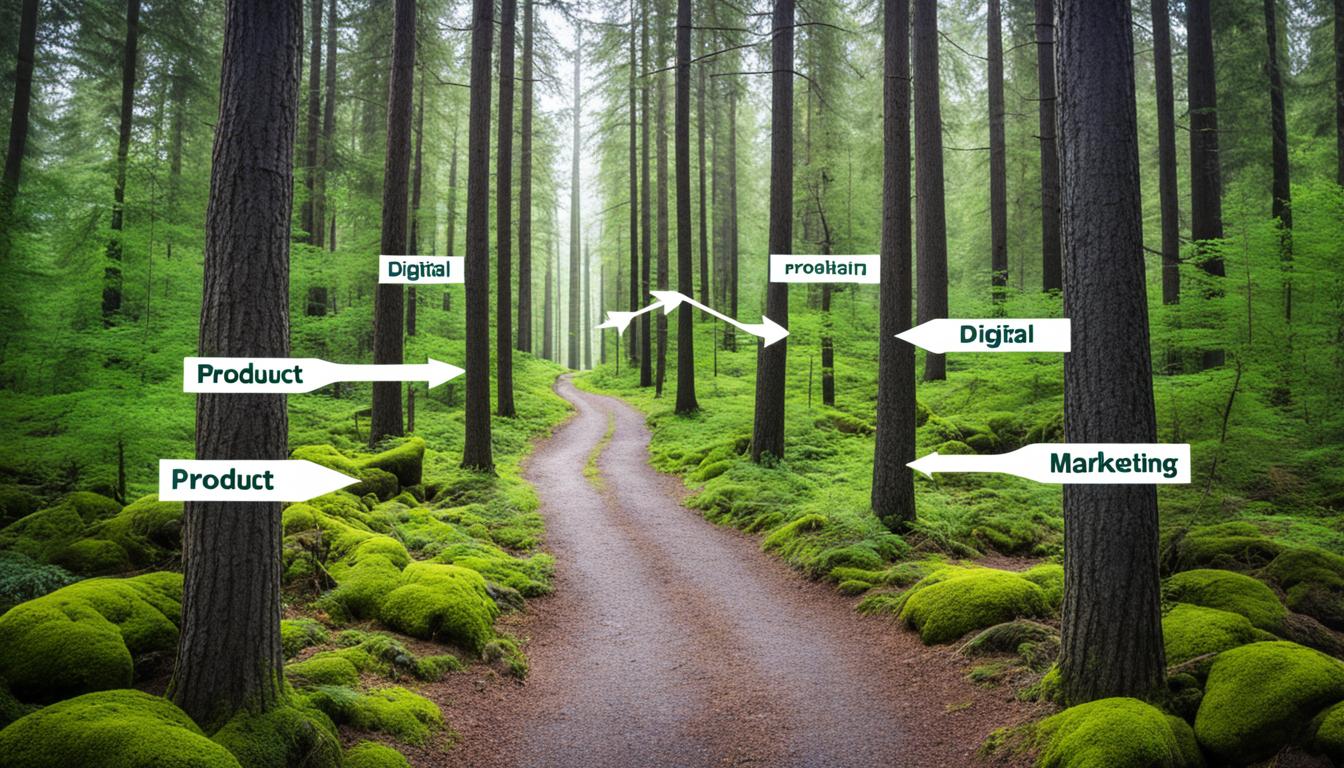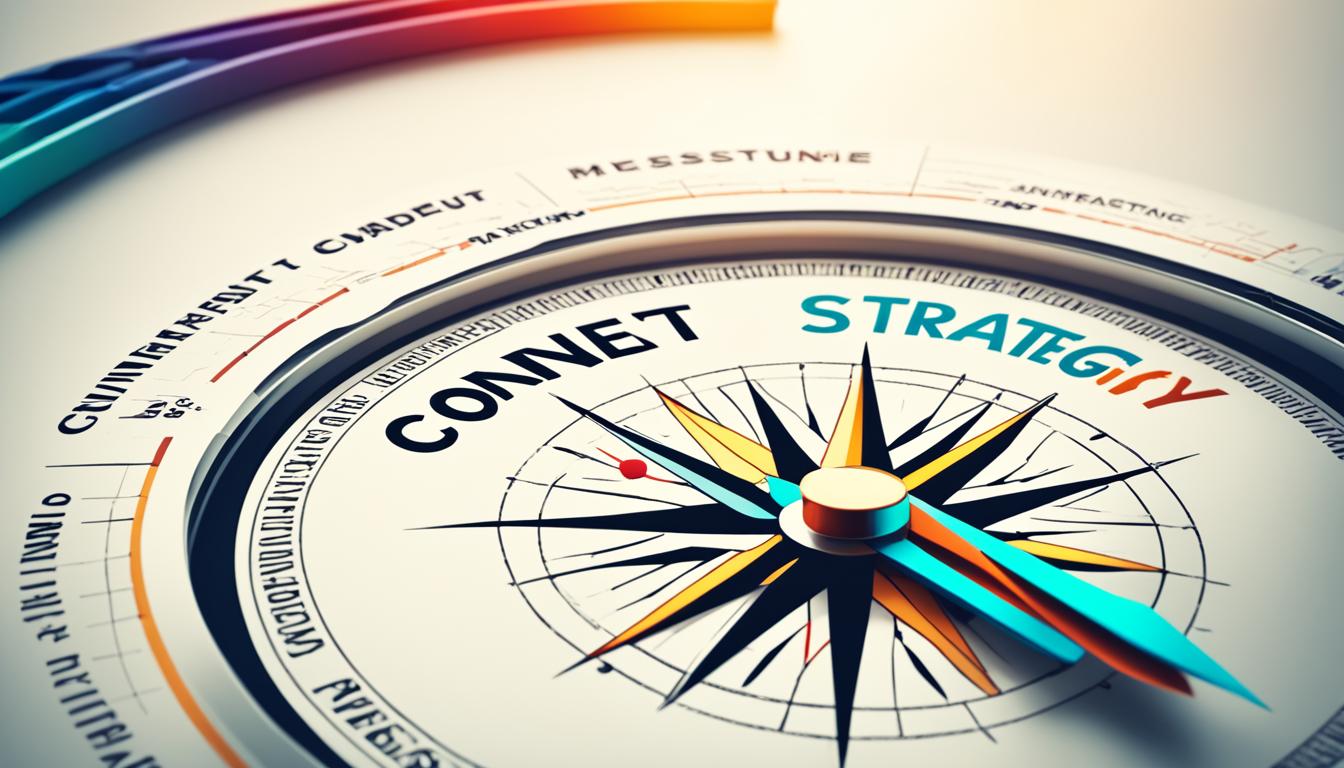White labeling in marketing lets businesses sell products under their brand without making them. Another company makes the product, and it’s then rebranded. This method is popular in retail, electronics, and beauty. It makes it easy for companies to adjust products to fit their brand style.
Key Takeaways:
- White labeling allows businesses to offer products under their own brand name without developing them in-house.
- It is commonly used in industries such as retail, electronics, and beauty/personal care.
- Companies can easily customize white label products to meet their branding and packaging requirements.
- White labeling lets companies grow their offerings without the need for product development or manufacturing.
- Customized white label products can match the quality of national brands.
What Is a White Label Product?
A white label product is made by one company but sold under another’s brand. The retailer’s name is on the label, making it seem like their own creation. This is known as private label branding and has been popular since the late 1990s.
Stores like Whole Foods Market and Walmart use white label products to grow their range. This way, they can offer more without making the products themselves. It saves them time, energy, and money on production and marketing.
White label products benefit both the maker and the seller. Manufacturers make quality items. Retailers can sell more kinds of products. Customers get more choices under brands they trust.
Advantages of White Label Products
- Expanded product lines: White label products let stores offer more without new product development. They can meet customer needs better.
- Discounted sales: Retailers can sell white label items cheaper than big brands. This attracts bargain hunters and increases sales.
- Quality control: White label goods often come from the same places as famous brands, so they’re high quality. Retailers check the production to keep customers happy.
Types of Businesses That Use White Label Products
Many industries, especially retailers, use white label products. They let businesses grow their brand with new products. We’ll look at the main business types that use white label products.
Retailers
Retailers, both big and small, use white label products to offer more variety. Big names like Target and Tesco use white label strategies. This helps them provide a mix of products to meet what customers want.
Multinationals
Big international companies see the worth in white label products too. In electronics, top makers rebrand their goods for other brands. This helps them use their making skills more and reach more customers.
Mass Merchandisers
Mass merchandisers like offering lots of choices at low prices. They find white label products really useful. This way, they can offer cheaper options without losing quality.
Electronics Companies
The electronics field is big on white label products. Famous electronics makers often make goods for other brands. This allows them to grow their market while using their tech and making knowledge.
Other Industries
But white label products aren’t just in retail or electronics. They’re also in web hosting, payment services, and beauty/care products. Companies in these areas can make white label goods that meet their customers’ needs.
White label products fit a lot of different businesses. They help them grow their offerings, reach more customers, and stay ahead in the market.
Advantages of White Label Products
White label products have a few key benefits for companies. Let’s dive into these perks more closely:
Expanded Product Lines
One big plus of white label products is the chance to grow your product range easily. Companies can work with a white label provider to find many ready-made products. Then, they can brand these products as their own. This strategy lets businesses add more variety quickly without spending a lot on development or marketing.
Discounted Sales
Selling white label products can be cheaper than selling big-name brands. These products usually cost less to make and market. So, businesses can sell them at lower prices. This attracts buyers looking for deals and can help companies sell more.
Quality Control
Some might think white label brands are of lower quality, but that’s not true. Many of these products are made by the same companies that produce items for well-known brands. This means they’re just as good. Companies that choose white label partnerships also get more say over product quality. They can set and keep high-quality standards.
Customization for Target Market
White label products let companies customize items for their specific audience. Since these products will carry the company’s brand, they can change the design, packaging, and features. This helps businesses provide something special that meets their customers’ needs and preferences.
| Advantages of White Label Products |
|---|
| Expanded product lines without extensive product development |
| Discounted sales relative to national brands |
| High-quality products from reputable producers |
| Customization options tailored to target market |
What Is a White Label Service?
White label products include both items and services. They let businesses sell services under their own brand without creating them. This is a cost-saving choice. Companies avoid the costs of making new products and marketing.
Such services are used in many fields like banking and digital marketing. Banks use them to give custom banking services without big changes or more staff. Digital marketing firms use them to offer websites, SEO, and PPC management as their own.
This approach lets companies focus on what they do best while offering more services. They can reach more customers, improve service choices, and meet changing needs. White label services help maintain a brand’s look and feel across all services.
| Benefits of White Label Services |
|---|
| Cost-effective solution |
| Faster time to market |
| Access to specialized expertise |
| Opportunity to expand service offerings |
Benefits of White Label Solutions
White label solutions bring many perks for businesses today. They help save money while getting to the market faster. More so, they offer great flexibility. This makes white label solutions a smart move for growing a company’s brand and market share.
Cost-Effectiveness
White label solutions are known for being cost-effective. They let businesses use existing products, avoiding high development and marketing costs. This way, companies can save money and focus on other vital business areas.
Faster Time to Market
White labeling speeds up product launch timings. Companies can use ready-made solutions instead of starting from zero. This ensures they meet customer needs quickly.
Greater Flexibility
Businesses can customize branding and packaging with white label solutions. This lets them match products with their brand identity and audience. It helps create a unified experience for customers.
Lower Minimum Order Quantities
White label products often require smaller starting orders. This allows businesses to try out their market without huge commitments. With smaller initial orders, companies handle their stock better and lower the chances of leftovers.
Better Quality Control
White label solutions mean better quality control for businesses. Companies work with trusted partners that match their quality expectations. Maintaining high quality helps in building a dependable reputation and customer satisfaction, aiding long-term success.
To sum up, white label solutions offer business growth, faster market entry, and flexibility. They allow starting with less commitment and maintaining quality, meeting customer expectations while reducing risks. Adopting white label solutions aids businesses in enhancing customer value and securing a competitive stance in the marketplace.
| Benefits of White Label Solutions |
|---|
| Cost-effectiveness |
| Faster time to market |
| Greater flexibility |
| Lower minimum order quantities |
| Better quality control |
Examples of White Label Branding
White label branding lets companies sell different products as their own. This is common in many industries. Here are some examples from various sectors:
1. White Label Software
Companies like Mailchimp and Constant Contact provide white label software. Agencies can then offer email marketing services with their brand on it. They can also customize the software for their needs.
2. Grocery and Retail
Grocery and retail stores often sell products like food and household items under their brand. These are made by other companies. This way, stores can offer cheaper options than national brands while keeping their brand visible.
3. Electronics Industry
In the electronics world, companies often make products like smartphones or TVs for others to rebrand. This helps brands offer more products and reach new markets without losing quality.
4. Web Hosting and Payment Gateway Providers
Web hosting and payment services also use white labeling. This lets businesses provide these services under their name. It saves them from having to build their own systems.
5. Beauty and Personal Care
The beauty industry uses white labeling a lot for cosmetics. Manufacturers make skincare and haircare products for brands to sell as their own. This allows companies to offer a wide variety of products to their customers.
White labeling helps businesses grow by letting them offer more products under their own brand. It supports brand identity and meets customer needs across different industries.
The impacts of white label branding in different industries
| Industry | Impacts of White Label Branding |
|---|---|
| Software | Allows agencies to offer customized software solutions under their own brand, enhancing their service offerings. |
| Grocery and Retail | Enables retailers to offer affordable alternatives, increase profit margins, and maintain brand presence with a diverse product range. |
| Electronics | Allows manufacturers to reach new markets and expand their product portfolio, while providing brands with quality products under their own branding. |
| Web Hosting and Payment Gateway | Enables businesses to offer hosting and payment solutions without the need for infrastructure development, saving time and resources. |
| Beauty and Personal Care | Provides cosmetic brands with a wide range of products to offer, allowing them to cater to the specific needs of their target market. |
White Label Digital Marketing
White label digital marketing means businesses team up with companies to get services. They then offer these services under their own name. That! Company is at the forefront of providing these solutions. They specialize in making websites more visible, managing online ads, using social media, and creating websites. These skills help businesses improve their internet presence and achieve better outcomes.
At That! Company, they work directly with clients but under the partner’s brand. This makes the customer’s experience smooth. Their main goal is to make the end customer happy. They aim to provide top-notch services that match the partner’s brand.
Using white label digital marketing lets businesses use expert help without needing their own team. This saves money and gets products out faster. It also lets businesses offer more to their clients. From making websites better for Google to managing ads, white label marketing helps businesses serve their clients’ varied needs and grow.
For companies wanting to offer more digital marketing services, white label marketing is key. With That! Company as a partner, businesses can stand out in the digital world. They can offer great results to their clients.
Advantages of Front Facing vs. Back-End White Label Solutions
White label solutions offer businesses two choices: front-facing or back-end. We’ll look at how front-facing solutions boost customer happiness. They also enhance the customer experience.
Front-facing solutions let the provider interact with clients using the partner’s brand. This method has many benefits for businesses.
Promoting Better Customer Experience
Front-facing solutions focus on the customer’s needs. They offer quick feedback and clear information. This means any issues are solved fast, making for a happy customer journey.
This approach creates trust and reliability. Thus, it improves the overall customer experience.
Efficient Communication and Quicker Results
With front-facing solutions, there’s no middleman. This means clearer, quicker communication with clients. The process is faster without delays common with too many parties involved.
Businesses see faster results and solve problems quicker. This is good for both the provider and the customers.
That! Company is a top digital marketing provider using a front-facing approach. They boost the partner’s brand and offer top-notch services. This leads to happier customers.
Opting for front-facing white label solutions improves brand experience. It builds trust with clients and supports business success.
Benefits of White Labeling and Private Labeling
White labeling and private labeling offer big benefits for businesses. They help to cut down costs a lot. By not having to build a brand, set up sales, or create products from scratch, companies save money.
These strategies give quick access to customers and distributors. This means companies can sell their products faster. They don’t have to spend time finding new customers.
They also make it easier to get products made and shipped. Businesses don’t have to invest in making facilities or finding materials. This lets them focus more on making their brand known.
Plus, businesses can use their partner’s marketing skills. This helps them reach more people. It’s a good way to grow in the market quickly.
They also offer help with sales and customer service. Businesses get to use the experience of their partners. This makes sure customers have a good experience.
In summary, white labeling and private labeling are great for growth. They cut costs and give access to customers, products, and marketing help. By using these methods, businesses can grow faster and do well in their fields.
Conclusion
White labeling in marketing lets businesses offer more products or services under their brand. It offers cost-saving solutions, faster market entry, better control, and flexibility. This can be very helpful.
Businesses can enter new markets and meet customer needs with white label solutions. It works for both products in retail and services in digital marketing. It helps companies grow their brand and get a bigger market share.
Instead of starting from scratch, businesses use white label solutions to save on costs and avoid complications. They can then concentrate on branding and marketing. This boosts their brand and leads to success in the market.



